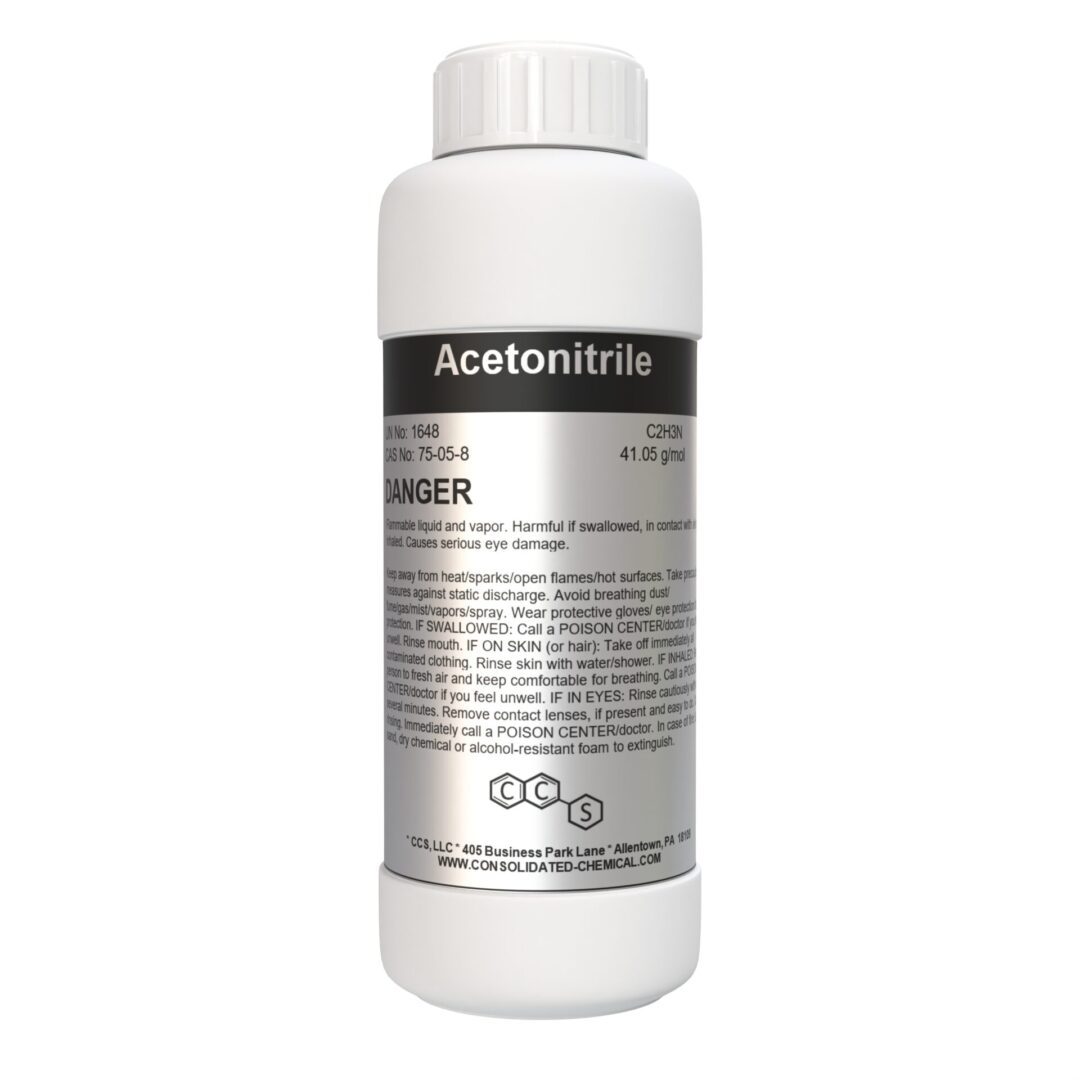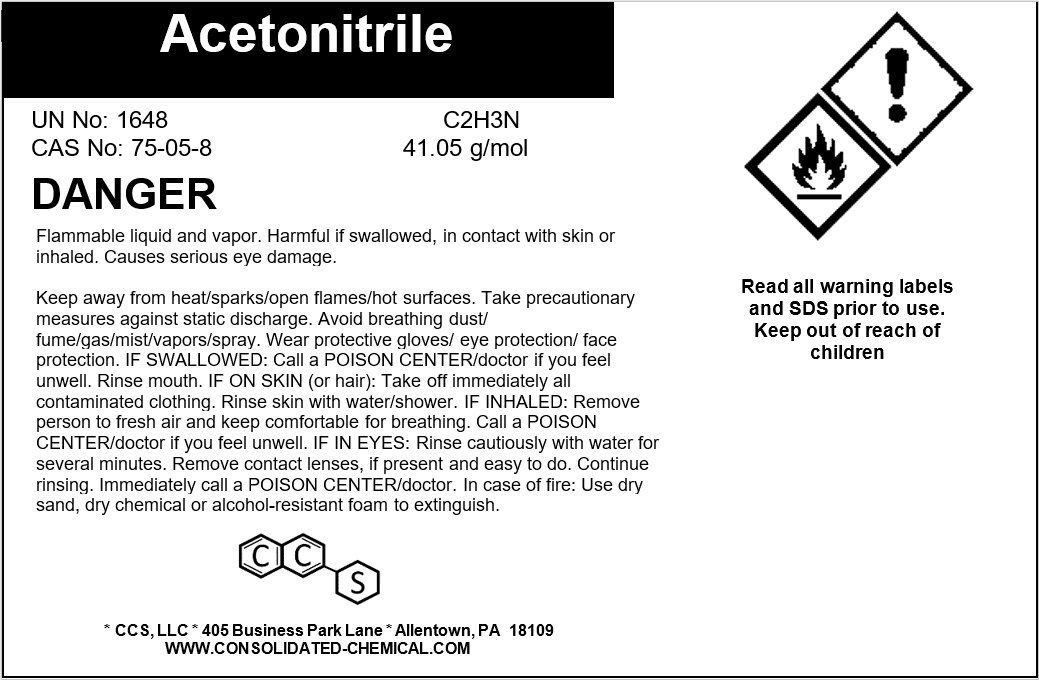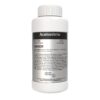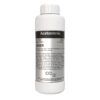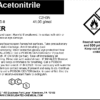Acetonitrile – High Purity Solvent
$18.00 – $59.99
Chemical Information:
- Chemical Name: Acetonitrile
- Chemical Formula: C₂H₃N
- IUPAC Name: Ethanenitrile
- CAS Number: 75-05-8
- Molecular Weight: 41.05 g/mol
Physical Properties:
- Appearance: Clear, colorless liquid
- Odor: Mild, ether-like odor
- Melting Point: -45°C (-49°F)
- Boiling Point: 81.6°C (179°F)
- Density: 0.786 g/cm³ at 20°C
- Viscosity: 0.37 mPa·s at 25°C
- Solubility in Water: Miscible
- Flash Point: 6°C (43°F) (Closed cup)
- Refractive Index: 1.344 at 20°C
Chemical Properties:
- pH: Neutral to slightly acidic (~6.5 when mixed with water)
- Polarity: Highly polar
- Stability:
- Stable under normal conditions.
- Avoid exposure to heat, open flames, and strong oxidizing agents.
- Reactivity: Reacts with strong acids, bases, and halogens.
Description
Acetonitrile is a high-purity, versatile organic solvent widely used across laboratory, analytical, and industrial applications. Known for its exceptional solvency power and low UV absorbance, it is a preferred choice for HPLC, spectroscopy, and chemical synthesis. Its low viscosity and high chemical stability make it indispensable for precise and reliable analytical processes.
Our acetonitrile is packaged in secure, leak-proof containers to maintain purity and safety. Whether you’re conducting research, producing pharmaceuticals, or developing advanced chemical formulations, our acetonitrile delivers consistent performance and quality.
Applications of Acetonitrile
Analytical Chemistry
- HPLC (High-Performance Liquid Chromatography):
- Used as a mobile phase solvent due to its low UV absorbance and high solvency power.
- Ideal for analyzing pharmaceutical compounds, biomolecules, and environmental samples.
- Spectroscopy:
- Frequently used in UV-Vis and IR spectroscopy as a solvent for sample preparation.
- Titrations:
- Acts as a solvent in Karl Fischer titrations to determine water content in samples.
Pharmaceutical Industry
- Drug Synthesis:
- Used as a reaction medium in the production of active pharmaceutical ingredients (APIs).
- Purification:
- Employed in crystallization and separation processes for high-purity compounds.
- Protein Analysis:
- Facilitates peptide and protein purification and analysis.
Chemical Synthesis
- Organic Reactions:
- Commonly used as a solvent in organic transformations, including alkylation, amination, and coupling reactions.
- Reagent Solvent:
- Acts as a carrier solvent for various reagents due to its excellent solvency properties.
Environmental Applications
- Sample Extraction and Testing:
- Used in extracting organic pollutants and analytes from environmental samples like water, soil, and air.
- GC Analysis:
- Acetonitrile is an effective solvent for preparing samples for gas chromatography (GC).
Industrial Applications
- Electronics Industry:
- Employed in the manufacture of lithium-ion batteries as a component of electrolytes.
- Chemical Manufacturing:
- Utilized as an intermediate or solvent in the production of pesticides, dyes, and other specialty chemicals.
- Polymer and Resin Processing:
- Aids in the processing and analysis of polymers.
Biochemistry and Biotechnology
- Protein and DNA Analysis:
- Used in bioanalytical techniques like mass spectrometry (LC-MS) and protein sequencing.
- Enzyme Studies:
- Acts as a solvent for enzyme-based reactions and stability testing.
Food and Beverage Industry
- Flavor and Fragrance Analysis:
- Acetonitrile is used for sample preparation and analysis in flavor and fragrance development.
- Residue Testing:
- Helps detect pesticide residues in food samples.
Research and Development
- Laboratory Solvent:
- A staple solvent for chemical and biochemical research.
- Chromatographic Separation:
- Essential for separating complex mixtures in research projects.
Storage:
- Temperature: Store in a cool, dry, and well-ventilated area at temperatures below 25°C (77°F).
- Containers: Keep in tightly sealed, chemical-resistant containers to prevent contamination and evaporation.
- Light Protection: Avoid exposure to direct sunlight and strong light sources.
- Segregation: Store away from incompatible materials such as strong oxidizing agents, acids, and bases.
- Flammable Storage: Store in a flammable liquids cabinet or an area compliant with local fire safety regulations.
Handling:
- Personal Protective Equipment (PPE):
- Wear chemical-resistant gloves, safety goggles, and a lab coat.
- Use respiratory protection in poorly ventilated areas or when handling large volumes.
- Ventilation: Work in a well-ventilated area or under a chemical fume hood to minimize vapor exposure.
- Avoid Contact: Prevent direct contact with skin, eyes, or clothing. Wash hands thoroughly after handling.
- Spill Management:
- Contain spills with inert absorbent materials like sand or vermiculite.
- Dispose of spill material according to local hazardous waste regulations.
- Fire Safety:
- Acetonitrile is highly flammable. Keep away from open flames, sparks, and high heat sources.
- Use non-sparking tools when transferring or handling.
Disposal:
- Dispose of unused acetonitrile and contaminated containers in accordance with local, regional, and national regulations for hazardous waste. Avoid release into the environment.
Additional information
| Size | 100mL (3.3 Fl Oz), 250mL (3.3 Fl Oz), 500mL (16 Fl Oz), 1000mL (Fl Oz) |
|---|
Related products
-
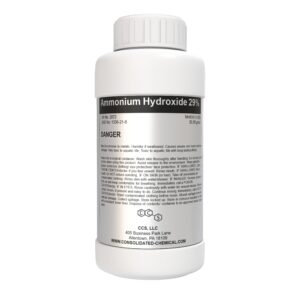
Ammonium Hydroxide 29% – Premium Aqueous Solution
$14.99 – $29.99 Select options This product has multiple variants. The options may be chosen on the product page -

Cinnamic Acid – High Purity | Premium Quality
$14.99 – $48.00 Select options This product has multiple variants. The options may be chosen on the product page -
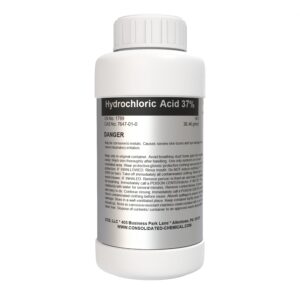
Hydrochloric Acid 37% Premium ACS Reagent Grade
Rated 3.00 out of 5$14.99 – $57.00 Select options This product has multiple variants. The options may be chosen on the product page -
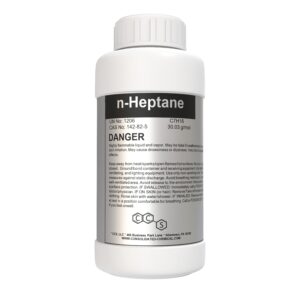
N-Heptane – High Purity Bestine Thinner
$14.00 – $67.00 Select options This product has multiple variants. The options may be chosen on the product page



